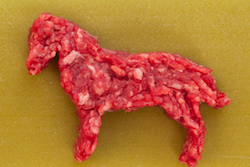Benefit for consumers as authorities supporting food authenticity research collaborate more closely
The horsemeat scandal of 2013 resulted in the launch of several major initiatives to counter food fraud and assure the integrity of the food supply chain. The European Commission has established a Food Fraud Network made up of competent authorities involved in identifying and communicating food fraud issues in EU countries. Industry and Government are involved in a number of initiatives aimed at providing cost-effective procedures for assuring the integrity of the food supply chain. But in order for these systems to work, knowledge and know-how needs to be shared between agencies, across borders. This is where the EU’s AUTHENT-NET (Food Authenticity Research Network) project steps in. The AUTHENT-NET Concerted Collaboration and Support Action was devised following early dialogue with national funding bodies, through a survey and workshop, before the project started. From those results it was clear there would be immediate benefits in just bringing the funding bodies together to share experiences and establish networks. “Very few of the attendees at the workshop were aware of each other and the only collaborations were through existing EU activities such as SUSFOOD,” explains project coordinator Professor Paul Brereton, Director of Strategic Alliances at the Institute for Global Food Security in Belfast. They acknowledged that much could be gained by merely providing an inventory of current information on what has been done, where and by whom, in terms of research and development in Member States. The project identified a set of urgent needs from a food authenticity control/detection perspective. These included: better harmonisation and sharing of research activity at an EU level to support issues around standardisation of methods (i.e. ‘fit for purpose methods’); improved access to reference standards, databases and reference materials, and the sharing of tools available for detection. As Prof Brereton puts it, an EU network on food authenticity research was acknowledged as the best way forward. Concerted action more effective than a fragmented approach AUTHENT-NET’s overall objective was to facilitate sustainable cooperation between national and international research funding bodies in the area of food authenticity, to improve the competitiveness of the food supply chain and the consumer confidence in it, by means of better co-ordinated, cost effective R&D. “We achieved this by ensuring all mechanisms and tools were co-created with the national funding bodies through a series of meetings/discussions, to ensure they were fit for purpose. For example, templates for collection of national data on research conducted within a Member State were co-designed, tested within one country (UK) and then revised slightly before being used by 13 more (as of July 2018),” says Prof Brereton. Similarly, the central information repository, the Food Authenticity Research Network Hub FARNHub, was co-designed with the funding bodies in order to ensure it met their needs. Consolidated information from each EU country is now freely available and accessible through the FARNHub. Many players lead to certain challenges It wasn’t always easy for AUTHENT-NET to establish precisely who was in charge of funding food authenticity work in each country. In most, authenticity/anti-food fraud was horizontally integrated across a number of research councils and government bodies with no overarching coordination. It was therefore necessary for the project to investigate the content and structures of various EU countries more intensively than was originally envisaged. Prof Brereton feels this aspect fed into the project’s most significant outcome, “I think the bringing together of people from different Member States, and getting them to think collaboratively, was the biggest achievement. A close second would be the tools that we have provided for doing that and for sharing their information.” Europe now benefits from more efficient food authenticity/anti-fraud capability The sharing of information and knowledge among Member States, and the concomitant increase in collaboration, is good news for EU citizens as both tax payers and consumers. There will be less duplication in research, thereby saving money, and enhanced protection against food fraud. “Personally,” says Prof Brereton, “as coordinator of the project, I am most proud of the consortium members. The commitment and ingenuity of the members of the consortium was great and resulted in over-delivery in many areas. FARNHub is a good example, where all of the fruits of our labours have been consolidated into one, open and accessible hub of information that will be sustained for at least three years after AUTHENT-NET finishes.”
Keywords
AUTHENT-NET, FARNHub, food fraud, consumer protection, food safety, food authenticity



